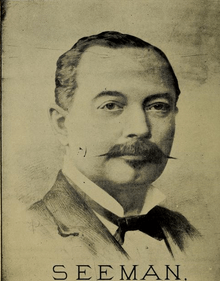Baron Hartwig Seeman

Hartwig Seeman (3 June 1833 – 1886) was a Swedish magician.
His father was a high-ranking officer in the Swedish army. His mother had died when he was ten years old. In his youth Seeman had developed an interest in magic trickery. Early in his career he worked as an artist and poet in Berlin, Germany. In 1860, he started performing professional magic. He had toured throughout Germany as a successful conjurer. He saved his money and travelled around Sweden and Norway, he became famous for performing an illusion known as "The Sphinx".[1] He has been described by magic historians as the "foremost magician of Sweden".[2]
On June 24, 1872, Seeman travelled to Benares in India to learn the tricks of fakirs.[3] Whilst in India, Seeman observed a levitation trick that involved a young girl floating into the air.[4][5]
In 1880, Seeman performed an "electra" illusion at the Academy of Music (New York City). It is considered to be an early suspension trick.[6]
His son Adolph Seeman was also a magician.
References
- ↑ Burlingame, H. J. (1891). Around the World with a Magician and a Juggler. Chicago: Clyde Publishing Co. pp. 11-15
- ↑ Price, David. (1985). Magic: A Pictorial History of Conjurers in the Theater. Cornwell Books. p. 116. ISBN 978-0845347386
- ↑ Claflin, Edward; Sheridan, Jeff. (1977). Street Magic: An Illustrated History of Wandering Magicians and Their Conjuring Arts. Dolphin Books. p. 19. ISBN 978-0385128643
- ↑ Gibson, Walter Brown. (1973). Secrets of Magic. Grosset & Dunlap. p. 81. ISBN 978-0448115658
- ↑ Siegel, Lee. (1991). Net of Magic: Wonders and Deceptions in India. University of Chicago Press. p. 212. ISBN 978-0226756875
- ↑ Stencell, A. W. (2002). Seeing is Believing: America's Sideshows. ECW Press. p. 137. ISBN 978-1550225297 "One of the first suspension tricks in America was presented at the N.Y.C. Academy of Music in 1880 by magician/showman Baron Hartwig Seeman. His Electra illusion resembled a gun turret with the barrel projecting out between an opening in the curtains to suspend a flying subject over the audience."
Further reading
- H. J. Burlingame. (1891). Around the World with a Magician and a Juggler. Chicago: Clyde Publishing Co.